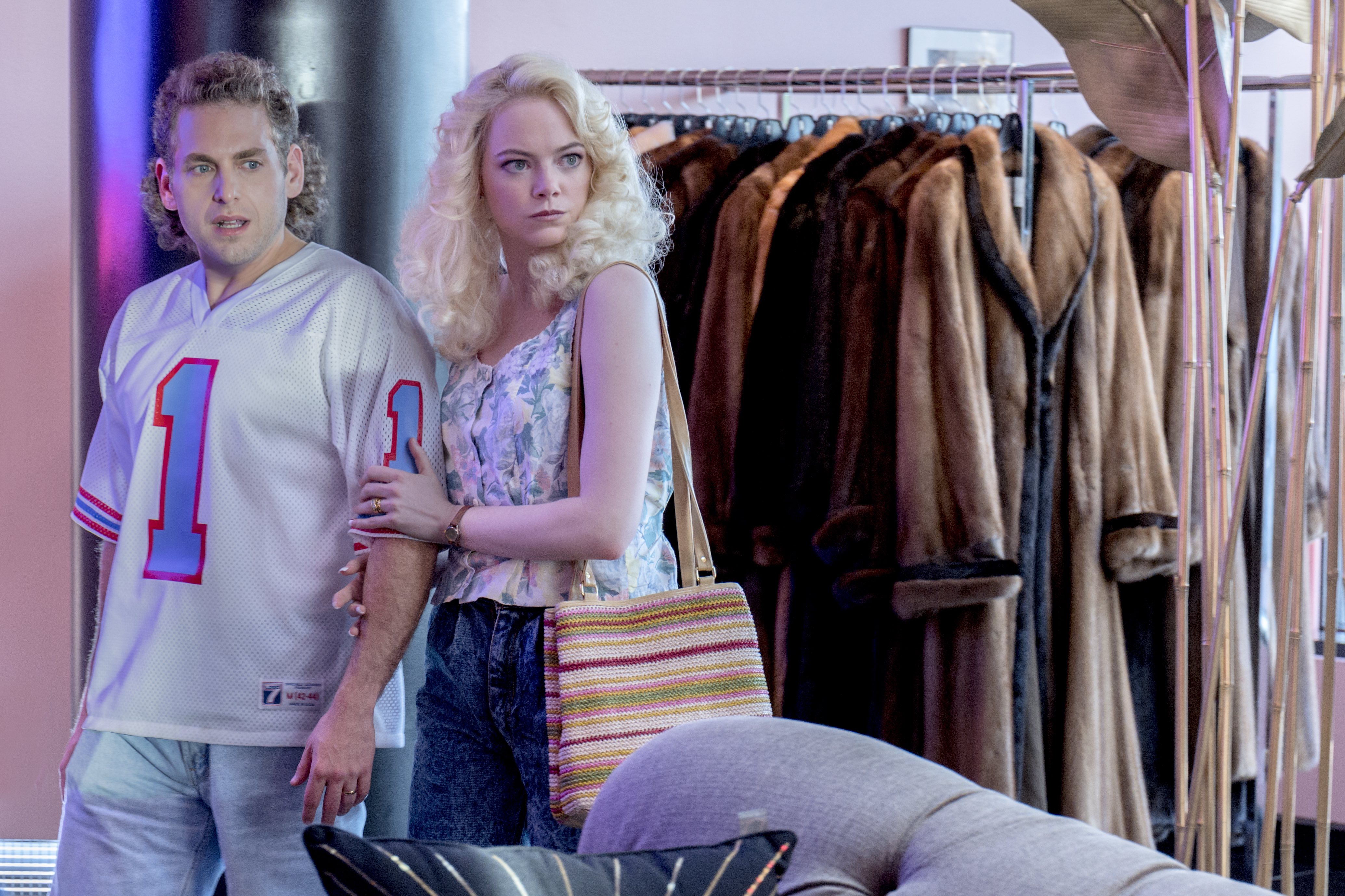Last week, Netflix premiered its new limited series “Maniac.” The show stars Emma Stone as Annie Landsberg and Jonah Hill as Owen Milgrim, two wayward souls trying to outrun the pain of being alive. Annie’s life is a cycle of destruction after her family falls apart, and the only way she can cope is by abusing mysterious pills snagged for her by a friend with pharma connections. Owen is the black sheep of his ultra rich, ultra terrible family, who repeatedly taunt him for past psychotic episodes; he thinks he’s crazy, longs for a family of his own and wonders whether being the first thing ruins his chances of getting the second.
With Owen yearning for change, and Annie out to find more pills to fuel her addiction, the two sign up to take part in a drug trial at Neberdine, a company that claims to have found a formula that replaces traditional psychotherapy by eliminating PTSD in three stages: an A pill, a B pill and a C pill. When Owen and Annie witness the trial take a sinister turn on its very first day, they forge an immediate bond and decide to tread lightly.
If all you’ve heard about this show is that it’s bizarre, well, that’s definitely true: It doesn’t imagine the future as you might envision it in 2018, but rather, it recalls how the future was imagined in the sixties, seventies and eighties. Boxy televisions talk, computers use horrid WordArt-like graphics, the lab computer system is reminiscent of Hal from “2001: A Space Odyssey.” “Maniac” dresses itself up retro; it’s a past interpretation of what the future looks like, but a very sincere examination of how attitudes around mental health have evolved.
In its first few episodes, the series is cold, wry and its only vibrance comes from brief flashes of a neon-lit city. The artificial vibrancy of this backdrop and of the culture that festers within it offer a world more concerned with dollar signs and simulated feeling than with the humanity of the people wandering its streets. The setting is a deliberate way to establish Annie and Owen’s detachment from their emotions. Everything around them is fake and chilly, and they, without any meaningful personal connections to speak of, have stooped to its level.
Even if “Maniac” is critical of the culture it is steeped in, it’s never cynical about its protagonists, who go to great lengths to achieve self-betterment. The result is an essential piece of genre-bending pop culture, a show that is kind to its audience and will be highly resonant for anyone struggling with their emotional and mental health. “What’s wrong isn’t that I’m sick,” Owen professes at one point, “it’s that I don’t matter.” And therein lies the connection that “Maniac” strikes between people who have a fraught relationship with themselves, and how that translates into emotional distance from others.
Without delving into the minutia of the plot, it can be said that the show lives up to its wild reputation. Annie and Owen go through the trial, where they meet the strange helmers of the process: Dr. Mantleray (Justin Theroux) and Dr. Fujita (Sonoya Mizuno), both of whom dress like polished mad scientists, not a hair out of place. On day one, a troubling incident has disturbing implications for the trajectory of the trial, but the show must go on. Annie and Owen are thrust into drug-induced dream sequences that force them to relive their worst traumas and confront past demons, sometimes together — a cause for concern among those running the tests, given that the protagonists have only just met.
It becomes clear early on that the show isn’t so much about the transformative experience of being inside their own minds, but of going through a transformative experience with someone else in a world where raw human connection is scarce and difficult to not completely f— up. In “Maniac”’s heightened reality, there are services for fake friends, for people who’ve been “doxed,” for people to rehearse emotional encounters, for people to sell their face for ads in exchange for quick cash.
Thus, you quickly sense the gravity of a real, authentic connection in the world that’s been created, and that’s because director Cary Joji Fukunaga (“True Detective” maestro and helmer of the next “Bond” film) has gone to such great lengths to make the disconnect convincing. Almost every episode seems to bring the show somewhere new in genre and style, but “Maniac” retains a singular voice thanks to Fukunaga’s vision.
The series also flirts with quixotism, its characters overwhelmed by deep-seated idealism. Annie wants her family to be whole again, Owen wishes his could be replaced, and though neither of these options are pragmatic, both are deeply desired. “There is no plan or pattern to the universe,” a resigned Annie tells Owen one day. “It’s just chaos.” Yet the show weighs two possibilities: Can people really lose their grip on reality, or is reality a turbulent force that shifts from person to person?
None of these big ideas would work without a great cast to anchor them. I love that “Maniac” has given its lesser-known players space to shine even with superstars like Stone and Hill in the lead roles, and Justin Theroux and Sally Field (Sally Field!) in supporting parts. The two standouts are Billy Magnussen, who you might know as the crazy brother from “Ingrid Goes West,” and who you’ll now know as the crazy brother from “Maniac”; and Sonoya Mizuno, who has done some fantastic character work in the last four years, judging by her turns in “Ex Machina,” “Crazy Rich Asians” and “Annihilation.”
By meditating on the inner lives of its characters, “Maniac” shows how the traumatic nature of past relationships can shape or stunt someone’s emotional growth. It also does an elegant job of personifying different kinds of mental illness, without making the people struggling with them seem alien or any less human than they are.
“Unfortunately,” Dr. Mantleray tells patients as they prep for the trial, “the brain is remarkably skilled at protecting itself.” It’s supposed to be one funny line in a show with many, but it scratches at something deeper. How can people terrified by rejection, humiliation or abandonment open up? With every drug-induced dream, where the essence of Annie and Owen’s pain reverberates back onto them, “Maniac” proposes that all trauma — like an open wound — needs exposure to heal.

















